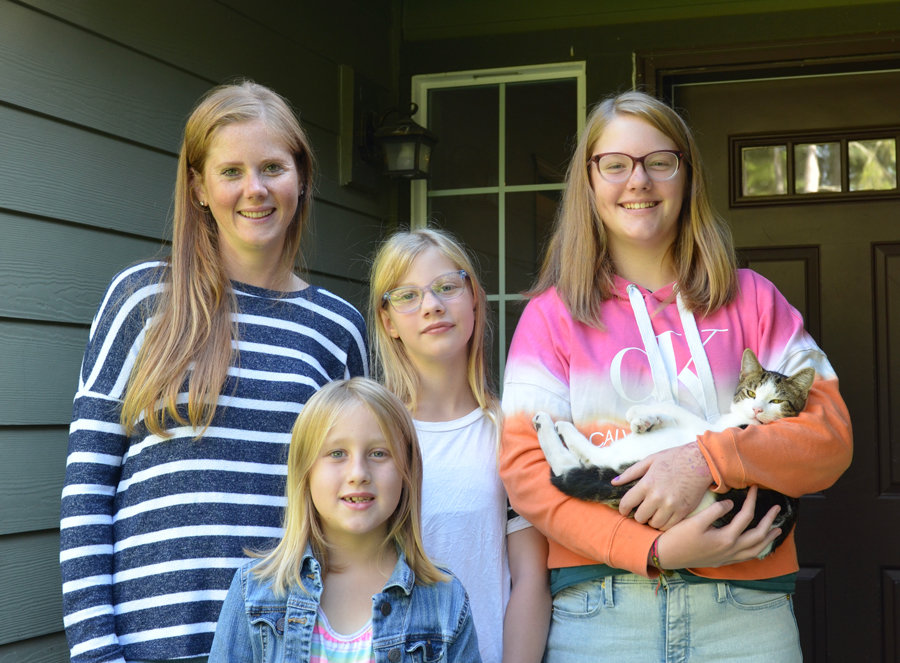
When local public schools closed to in-person learning in March 2020, there were 361 students from 199 families receiving home-based instruction, also known as homeschooling, within Peninsula School District boundaries. In the 2020-2021 school year, that number more than doubled to 802 homeschooled students from 514 families.
Statistics from the Washington Office of Superintendent for Public Instruction (OSPI) showed that home-based instruction nearly doubled in 2020-2021, with 39,843 students from 25,384 families homeschooling statewide, up from 20,844 students from 13,614 families in 2019-2020.
COVID-19 may have fueled recent growth in home-based instruction but there are many reasons why families choose to homeschool, including children with special educational needs, a desire for faith-based instruction or dissatisfaction with local schools.
“I chose to homeschool,” said Shabadrang Khalsa, who is providing home-based instruction for her 7-, 8-, and 10-year-old children on the Key Peninsula. “With all the uncertainty of the pandemic, I just try to stay away from it as much as possible. As we have seen nationwide, now that schools have opened up, lots of kids are filling up hospitals with Covid cases. I didn’t want to be a part of that human experiment.”
For K-1, Khalsa homeschooled her oldest child, who then attended public school for the second grade but returned to homeschooling when the pandemic hit.
“It feels really overwhelming to have to teach three different lessons, so we pick as a family what lesson we will do each week,” she said. For a science lesson on the five senses, her older child made a poster and wrote a report, while the youngest talked about how soap looks, smells and feels while washing dishes.
Charleen Haynes, whose family splits their time between her childhood home on the Key Peninsula and her husband’s home country of Egypt, provides home-based education for her younger children, Robert (7), Freddy (5) and Cecilia (3). Homeschooling gives the family flexibility to spend spring and summer on the KP during the months when her oldest daughter Lucille’s (16) French school in Egypt is not in session.
While in Egypt, they study in a Montessori-style classroom off their backyard. At Haynes’ father’s house in Taylor Bay, they continue lessons and enjoy spending time outdoors. “You have to make it fun,” said Haynes, who has a background in teaching. “They all have reading and writing and math, and we’re putting in history and science now.”
“I’m not against school in general,” Haynes said. “All of my kids are Egyptian-American. I wanted to incorporate things in their lessons that covered both, and I wanted to take out things in their lessons that they didn’t need. So, in both countries (homeschooling) was a good idea.”
Hailey Lystad of Lakebay, who has been homeschooling her daughters for nine years, said, “I appreciate the light being shined on homeschooling, that it’s not this stuck-in-a-cave thing. With public school on Zoom, moms and dads had to oversee their kids and make sure they were doing what they’re supposed to be doing and it’s a little taste of what homeschooling is like, and it’s not this awful thing where kids don’t know how to act in society.”
Prior to the pandemic, Lystad’s daughters Ava (13), Norah (11) and Charlotte (7) had a busy schedule that included a homeschool co-op, in-person English and P.E. classes, an online math class, book work in various subjects, plus swim team and classes at the YMCA. They enjoy Skate Night at the KP Civic Center and have a wide network of friends.
“I feel like there’s a big misconception with homeschooling that our kids aren’t socialized, that we just sit at home five days a week and they’re sheltered, and that can’t be further from the truth,” Lystad said. “When everything shut down, we were stuck at home and we went just as stir crazy as everybody else.”
Lystad received a combination of private school education and home-based instruction, with schoolwork conducted via videos of teachers’ lessons and assignments by mail, a retro version of virtual classes and homework submitted online. “I was homeschooled for everything but five years, so I’m obviously pretty familiar with it. I absolutely loved it when I was a kid,” she said.
Lystad and her husband Caleb’s dissatisfaction with the public school system, combined with her own positive experience, led to their choice to homeschool. “We felt that we could give them a better education than public school education, so that’s why we’ve gone that route,” she said. “I had an excellent education. I got a GED only because I didn’t have a path to get a diploma, but I tested out at college grade level when I was finished with school.”
OSPI statistics on home-based education, although a clear indicator of growth, may not provide a complete picture of the recent increase in home-based instruction because Washington state law only requires homeschooling families to meet criteria and file intent to provide home-based instruction for children starting at age 8. As of press time, home-based instruction numbers for the 2021-2022 school year were unavailable.
For more information go to www.k12.wa.us/student-success
UNDERWRITTEN BY THE FUND FOR NONPROFIT NEWS (NEWSMATCH) AT THE MIAMI FOUNDATION, THE ANGEL GUILD, ADVERTISERS, DONORS AND PEOPLE WHO SUPPORT INDEPENDENT, NONPROFIT LOCAL NEWS